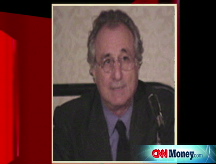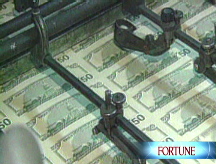70 years before Madoff, there was Whitney
Former New York Stock Exchange president Richard Whitney boasted a sterling reputation during the Depression, then became a symbol of Wall Street's betrayal of investors.
(Fortune) -- He had headed one of the world's biggest stock markets, and was known as "The Voice of Wall Street." His brokerage company attracted wealthy investors, including one of the nation's most elite clubs. Then, as his firm collapsed amid the worst economic downturn in decades he admitted it had all been a sham.
The embezzler? Not former NASDAQ stock exchange chairman Bernard Madoff. This Wall Street villain's crimes occurred more than 70 years ago. His name was Richard Whitney. The fall of the former New York Stock Exchange president and securities firm principal captivated a nation that was struggling to emerge from the Great Depression. Like Madoff, Whitney boasted a sterling reputation and was regarded as a savvy investor who steered clients successfully through perilous market storms. Both men's alleged crimes went undetected by authorities for years. And both instantly became symbols of Wall Street's betrayal of investors.
While Madoff hailed from simple roots and attended Hofstra University, Whitney was born on third base, the scion of a prominent New England family. The Groton and Harvard man had rowed on his schools' crews and played football. He served for five years as the president of the New York Stock Exchange and played a key role in helping slow the stock market slide in October 1929. On Black Thursday, as panic reached a crescendo, he dramatically placed a series of generous bids on shattered blue chip stocks, helping bring confidence back to the markets. "Richard Whitney Halts Stock Panic," headlines proclaimed.
But Whitney was living a lie. For years, he concealed growing problems at his firm, Richard Whitney & Co. Finally, in March 1938, the firm collapsed, causing a brief sell-off in the New York Stock Exchange.
Whitney, who like Madoff, took blame for the firm's admitted wrongdoing, went down fast. After the firm's fall it took just one month for him to be indicted and shipped off to the slammer. He pleaded guilty to stealing $214,000 from funds he supervised. At his sentencing, he received a withering rebuke from the judge.
"To cover up your thefts and your insolvency, you resorted to larcenies, frauds, misrepresentations and falsifications of books," the judge thundered, adding that Whitney had dealt "the decent forces of America" a "severe setback."
One of his main victims: The New York Yacht Club.
According to a contemporaneous New York Times account, the disgraced financier was fingerprinted on an April morning, sent to the showers with the other prisoners, "and his well-tailored blue serge suit, polo coat and gray felt hat were laid aside for a baggy suit of gray prison shoddy and ill-fitting cap." He was shackled to two extortionists and escorted out of The Tombs. A crowd of 5,000 people assembled at Grand Central Station to see Whitney's train off before it headed north along the Hudson River to Sing Sing prison. An auction of his belongings, which included a pair of pearl studs, and a key-wind watch, brought just $763.
Whitney was paroled in 1941 after serving more than three years of his five- to ten-year sentence. He became the manager of a dairy farm, supervising three farmhands and 25 cows. In 1946, he went back into business when he became president of a textile company that made yarns from the ramie plant, which grew in the Florida muck. The former financier died in 1974 at the age of 86. ![]()
-
 The retail giant tops the Fortune 500 for the second year in a row. Who else made the list? More
The retail giant tops the Fortune 500 for the second year in a row. Who else made the list? More -
 This group of companies is all about social networking to connect with their customers. More
This group of companies is all about social networking to connect with their customers. More -
 The fight over the cholesterol medication is keeping a generic version from hitting the market. More
The fight over the cholesterol medication is keeping a generic version from hitting the market. More -
 Bin Laden may be dead, but the terrorist group he led doesn't need his money. More
Bin Laden may be dead, but the terrorist group he led doesn't need his money. More -
 U.S. real estate might be a mess, but in other parts of the world, home prices are jumping. More
U.S. real estate might be a mess, but in other parts of the world, home prices are jumping. More -
 Libya's output is a fraction of global production, but it's crucial to the nation's economy. More
Libya's output is a fraction of global production, but it's crucial to the nation's economy. More -
 Once rates start to rise, things could get ugly fast for our neighbors to the north. More
Once rates start to rise, things could get ugly fast for our neighbors to the north. More









